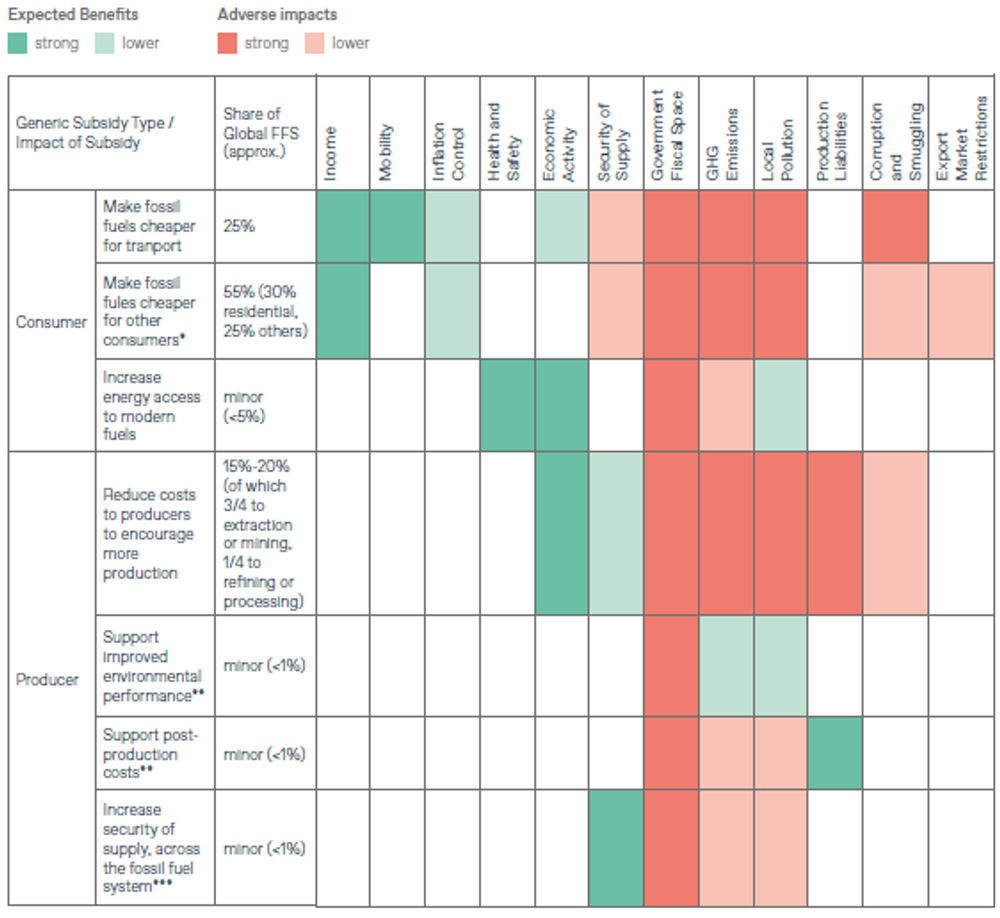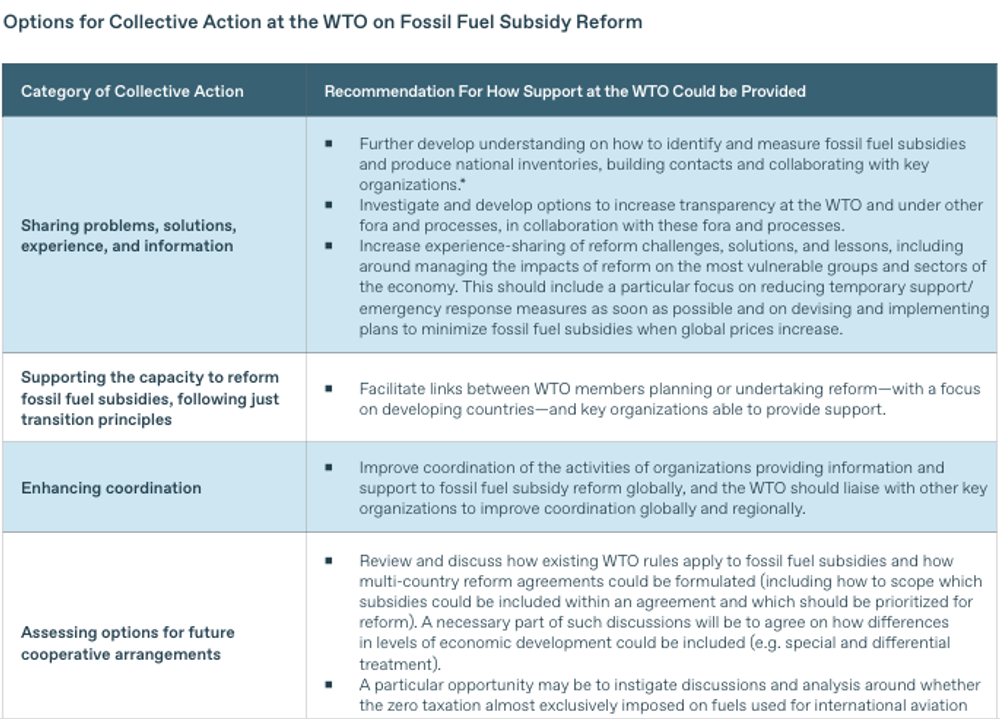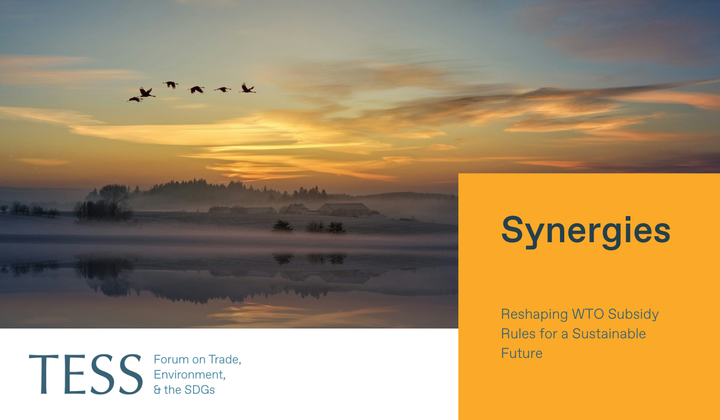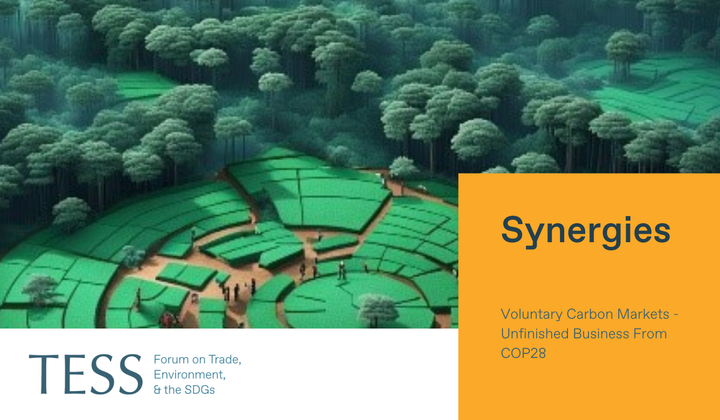As the world seeks to transition away from fossil fuels, there is a strong rationale for collective action on fossil fuel subsidy reform. Among the many international agreements and processes relevant to such reform, the WTO could expand its role.
This article is part of a Synergies series on reviving multilateralism curated by TESS titled From Vision to Action on Trade and Sustainability at the WTO. Any views and opinions expressed are those of the author(s) and do not necessarily reflect those of TESS or any of its partner organizations or funders.
-----
Moving away from fossil fuels is an imperative across much of the world, as recognized in the UNFCCC COP 28 decision text of 13 December 2023 on the outcome of the first global stocktake, which calls on parties to contribute to “transitioning away from fossil fuels in energy systems, in a just, orderly and equitable manner, accelerating action in this critical decade, so as to achieve net zero by 2050 in keeping with the science.”
Greenhouse gases from the combustion of fossil fuels are the major man-made contributor to global warming, leading to climate-related risks and extreme events of mounting severity around the world. Many of the worst climate impacts occur in developing countries facing a range of sustainable development challenges, often reversing hard-won development gains. The International Energy Agency’s Net Zero Emissions by 2050 Scenario shows that the path to 1.5°C sees fossil fuel demand drop by more than a quarter by 2030 and 80% in 2050.
Beyond producing greenhouse gas emissions, fossil fuels lead to a range of other adverse impacts, for example as a major contributor to local air pollution in many locations and building up significant environmental liabilities at numerous production sites. On top of diminishing these impacts, the transition away from fossil fuels will also reduce countries’ exposure to fossil fuel markets, where prices can be highly volatile. Yet there are also expected benefits from fossil fuel subsidies, including those targeted at vulnerable populations in low-income countries.
The Challenge of Reforming Fossil Fuel Subsidies
Over recent years, progress has been made in reducing or eliminating fossil fuel subsidies in many countries, yet their global value remains around $600 billion globally in a typical year (noting that they doubled in 2022), with many more fossil fuel subsidies not identified or quantified due to often incomplete or non-transparent government information.
Subsidizing fossil fuels works against the need to reduce fossil fuel consumption as it lowers prices, thereby increasing consumption and making fossil fuels artificially more competitive compared to alternatives such as renewables. Higher fossil fuel consumption intensifies adverse impacts.
The global value of fossil fuel subsidies is around $600 billion globally in a typical year, with many more subsidies not identified or quantified due to often incomplete or non-transparent government information.
Fossil fuel subsidies are introduced for a range of reasons. A comparison of the expected benefits and adverse impacts for each of the main categories of consumer and producer subsidies are shown in the table below. All subsidies reduce governments’ fiscal space, as they divert public money away from other priorities such as health, education, or investing in the green transition and infrastructure. But the table shows that all categories of subsidies have both expected benefits and lead to adverse impacts, which makes them complicated to reform (i.e. to reduce or eliminate).

Expected Benefits and Adverse Impacts of Fossil Fuel Subsidies and Approximate Share of Global Fossil Fuel Subsidies (Wooders, 2024)
We Understand How to Reform Fossil Fuel Subsidies but the Process Must Be Just
How to reform fossil fuel subsidies is well understood: alternative support measures must be implemented and any remaining subsidies targeted to those who need them. Fossil fuel subsidies are often highly inefficient—i.e. only a small share of the benefit they bring goes to those consumers or parts of the economy that they are designed to assist. Alternatives to providing support—e.g. direct payments to households to help prop up their incomes—are easier to target, less expensive, and cause much lower associated adverse impacts.
The transition away from fossil fuels must be just and fossil fuel subsidy reform should follow the same principle—ensuring that the process is as inclusive and fair as possible and that vulnerable parts of society are not adversely impacted by reform. Successful reform examples and good practice follow this principle. The COP 28 decision text notes that inefficient fossil fuel subsidies should be phased out “as soon as possible,” except for those subsidies which “address energy poverty or just transitions.”
However, developing countries face particular challenges in reforming fossil fuel subsidies as large parts of their population can be vulnerable to fuel price increases and less public resources are available to provide alternative support or develop social safety nets. Reform progress is thus expected to be slower and less complete than in developed countries. Yet easing the fiscal burden of fossil fuel subsidies can be extremely important in low-income countries, and the benefits of many subsidies tend to accrue to wealthier consumers and businesses.
Developing countries face particular challenges in reforming fossil fuel subsidies as large parts of their population can be vulnerable to fuel price increases and less public resources are available to provide alternative support or develop social safety nets.
Priorities for Fossil Fuel Subsidy Reform
Approximately 70% of global fossil fuel subsidies by value are granted to three categories: transport consumers (≈30%), residential consumers (≈25%), and oil and gas producers (≈15%). Major reduction of fossil fuel subsidies—and the adverse impacts that they cause—can only be successful if there is reform of these categories, freeing government budgets for other societal priorities. The high relative adverse impacts of coal call for urgent reform of subsidies to this fuel.
Some of the minor fossil fuel subsidies by value can have important development objectives. Reform of such subsidies—e.g. to remote communities or for access to modern energy sources for poor and vulnerable populations—require careful consideration, with particular focus given to the development of alternative support measures. While a periodic review of all fossil fuel subsidies is recommended, many of the minor ones will not be a priority for reform, especially in low-income countries. The main financial and environmental benefits of reform will come from eliminating and/or reducing the three larger categories of fossil fuel subsidies.
The Case for Collective Action
There is a strong rationale for collective action on fossil fuel subsidy reform. This is because world fuel markets are highly competitive and domestic subsidies can lead to significant distortions across markets. Second, energy markets are also globally connected and the actions of a large country on domestic production or consumption can affect other countries and potentially security of supply. Third, the global warming effect and the pollution associated with fossil fuel use directly affects third countries beyond national borders. Finally, there are several commonalities between countries in the types of subsidies they have and their reform challenges (even if there are major differences between countries in terms of vulnerabilities and the availability of resources to cushion rising prices).
There is a strong rationale for collective action on fossil fuel subsidy reform.
Among the many international agreements and processes relevant to fossil fuel subsidy reform, the World Trade Organization (WTO) could expand its role. The organization is the custodian of the Agreement on Subsidies and Countervailing Measures (SCM Agreement), which includes a definition of subsidies tested by a wide experience of jurisprudence. Fora where subsidies are discussed at the WTO include the Committee on Trade and Environment, SCM Committee, Trade Policy Review Mechanism, the member-led Trade and Environmental Sustainability Structured Discussions (with subsidies the focus of one of its four working groups), and the Fossil Fuel Subsidy Reform initiative (which at the Thirteenth WTO Ministerial Conference in February 2024 committed to proposing “concrete options” to guide its work).
Options for Collective Action at the WTO
Moving forward, there are four categories of collective action where the WTO could contribute to fossil fuel subsidy reform efforts. The table below provides options for how this contribution could be provided in each of these categories. Inclusive cooperation in these areas will require consultation with the WTO membership as well as other stakeholders active in the field, including intergovernmental organizations, multilateral development banks, international financial institutions, and non-governmental organizations.
Collective action is essential to driving the urgently needed reduction and elimination of fossil fuel subsidies that hasten the climate crisis. The WTO has a key role to play in this reform.

Options for Collective Action at the WTO on Fossil Fuel Subsidy Reform (Wooders, 2024).
-----
Peter Wooders is an independent energy specialist.
-----
Synergies by TESS is a blog dedicated to promoting inclusive policy dialogue at the intersection of trade, environment, and sustainable development, drawing on perspectives from a range of experts from around the globe. The editor is Fabrice Lehmann.
Disclaimer
Any views and opinions expressed on Synergies are those of the author(s) and do not necessarily reflect those of TESS or any of its partner organizations or funders.
License
All of the content on Synergies is licensed under a Creative Commons Attribution-NonCommercial-ShareAlike 4.0 International (CC BY-NC-SA 4.0)
license. This means you are welcome to adapt, copy, and share it on your platforms with attribution to the source and author(s), but not for commercial purposes. You must also share it under the same CC BY-NC-SA 4.0 license.
If you would like to reuse any material published here or if you have any other question related to Synergies, send an email to fabrice.lehmann@graduateinstitute.ch.




